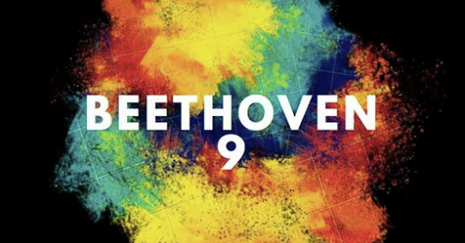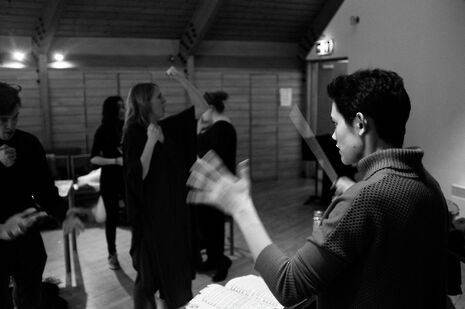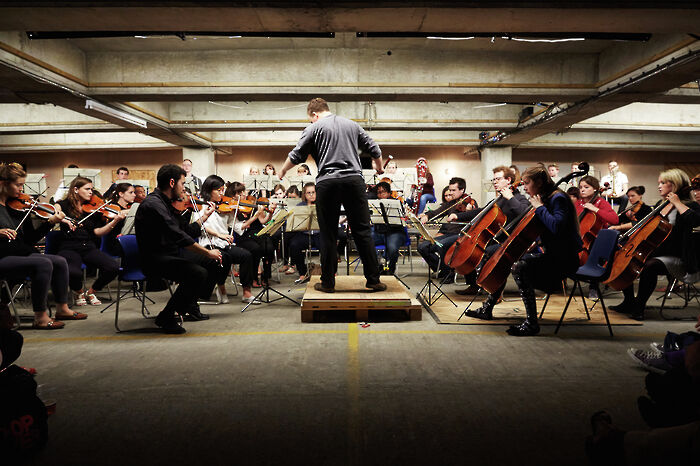SJMS Beethoven 9 review: a night of ‘skill, warmth and passion’
Sarah Collins gives her take on a night of Beethoven in St. John’s Chapel, conducted by Stephanie Childress

Hurrying into St John’s College on 27th October, a cold Friday evening, I grabbed a program from a steward at the door and squeezed myself onto a pew in the chapel. I fell into the embrace of the thick coats of the freshers sat either side of me, who kindly let me join their corner of the packed audience. I looked up and the roof of the chapel soared above me; though the underdog to the King’s College Chapel, John’s’ perhaps holds an ever greater charm, stretching towards the heavens with glorious roof timbers and stained glass windows, but not so edifying as the grey stone of King’s.
I was here for the St John’s College Music Society performance of Beethoven’s 9th Symphony, his final complete work. The rendition was masterful, with the orchestra successfully filling the intimidatingly vast chapel with a swell of music that carried the audience effortlessly from the first sonata to the triumphant choral finale.

Finalist of the 2016 BBC Young Musician of the Year Competition, Stephanie Childress, was both the conductor and the concert’s stand out performer. From the moment she entered the Chapel she commanded the orchestra with such poise and energy that it was truly impossible to believe she was only eighteen years of age. In a video played before the concert, St John’s’ Director of Music commented on some of the notable young conductors of the past, such as Sir John Eliot Gardiner and Sir Simon Rattle. Perhaps such heights too lie in wait for Childress, who successfully tackled what she described in her Twitter feed as “the gargantuan mass of music” that is Beethoven’s 9th symphony.
The ensemble similarly captured the glorious energy of the symphony. Particular highlights included the string tremolos in the opening theme and the climax in the fourth movement, which woke up a student who had drifted off to sleep. He raised his head in alarm to the roar of the orchestra and choral parts as they gathered force for the infamous ‘Ode to Joy’.
The choral parts were sung powerfully and adeptly, and the soprano, Helena Moore, tackled the intricacies of the soaring score with skill. However, the choral parts did not quite match the performance of the orchestra, that more successfully varied the pace and timbre to reach the climax of the finale. Similarly, the horns in the third movement did not quite meet the excellence of the strings in the first, but still formed part of a triumphant performance of a symphony often heralded as one of the greatest ever written.
I had signed up to review the concert at the last moment, after a week that had been stressful and dissatisfying. Classical music had often felt inaccessible to me, but tired after a week of wrestling with CVs, cover letters and law essays, I wanted the music to transport me away from the bubble of deadlines and ‘key competencies’ in which I had been trapped. I wanted to be reminded, in the midst of my existential panic about my future, that life is rich and beautiful and meaningful and that I would be ok. That’s a lot of pressure to put on a concert.
But as I closed my eyes and listened to Beethoven’s stunning melodies, I felt the awesome power of music to communicate and resonate from centuries ago to reveal those human truths that transcend time. As an audience we communed in the joy exuded from the performers as they rendered the music they loved with skill, warmth and passion. For the hour and a half of Beethoven’s 9th Symphony I found the peace I had been searching for.
 News / University Council rescinds University Centre membership20 February 2026
News / University Council rescinds University Centre membership20 February 2026 News / Hundreds of Cambridge academics demand vote on fate of vet course20 February 2026
News / Hundreds of Cambridge academics demand vote on fate of vet course20 February 2026 News / Judge Business School advisor resigns over Epstein and Andrew links18 February 2026
News / Judge Business School advisor resigns over Epstein and Andrew links18 February 2026 News / Union cancels event with Sri Lankan politician after Tamil societies express ‘profound outrage’20 February 2026
News / Union cancels event with Sri Lankan politician after Tamil societies express ‘profound outrage’20 February 2026 News / Caius students fail to pass Pride flag proposal20 February 2026
News / Caius students fail to pass Pride flag proposal20 February 2026










